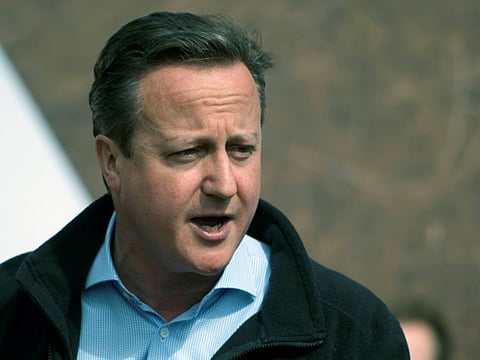Britain blunders into unknown territory
It’s doubtful that the majority of people in the UK has a handle on what’s at stake in Cameron’s ‘Brexit roulette’

There’s a good chance that David Cameron will be remembered as the worst British Prime Minister in living history. He’s the elected leader of the country but he’s no decision-maker, preferring to throw crucial decisions, such as military intervention in Syria, Scottish independence and now Brexit into the laps of lawmakers or citizens. He’s proved to be more of an administrator than a head of state in the mould of Winston Churchill or Margaret Thatcher.
It could be argued that giving power to ‘we the people’ is the essence of democracy. But if that’s the basis on which a country is run, then instead of a prime minister, a cabinet and a parliament, there should be people’s councils. What’s the principle behind the people getting to decide some issues but not others?
In the case of the upcoming Brexit referendum, Cameron, who’s begging Britons not to opt for an exit, should not have acceded to the demands of Conservative Party anti-EU grandees to hold it in the first place, which he did to secure their support for his personal political ambitions at a moment in time when he was pretty certain the nation would vote to stay in.
Now that the mood has shifted more in favour of Brexit, he’s in panic mode. And who can blame him when a headline in the Financial Times rightly refers to ‘Brexit Roulette’. A better headline would be ‘Russian Roulette’. “The polls are close, sterling has taken a pummeling and the UK economy appears to have paused for breath,” the article reads. When Cameron’s reasonable arguments fell on stony ground, he resorted to the ultimate threat — Brexit could negatively affect “peace and stability on our continent”.
He was savaged for that assertion but it may hold a grain of truth when Spain has threatened to “shut down” Gibraltar if Britain leaves. Spain’s Foreign Minister Jose Manuel Garcia-Margello has characterised the UK’s departure as “a golden opportunity” giving Spain more leverage with the United States.
Moreover, the heads of EU states may not be inclined to grant the UK a soft departure given that the referendum has undermined the stability of the entire EU project. The Guardian reports that almost half of EU citizens in eight EU countries demand their own referendum, according to polls.
According to London’s new mayor Sadiq Khan, who recently met with his Paris counterpart Anne Hidalgo, Paris is poised to “roll out the red carpet to welcome London companies”. France’s Finance Minister Michel Sapin says the EU would accelerate plans for closer integration.
Granted, the UK population is largely educated, but it’s doubtful that the majority has a handle on what’s at stake from the perspective of international corporations, businesses, import-export, the City of London, the currency, geopolitical influence and national security.
I suspect that a substantial number will cast their ballots according to a sense of misplaced patriotism or to keep workers from poorer EU countries from ‘taking their jobs’ or because they resent being told what to do by fat cats in Brussels or because they hate that taxpayers’ money is being squandered on the EU ‘gravy train’.
How many will take the trouble of doing a cost-benefit analysis even if they have sufficient in-depth knowledge of the pros and cons, I wonder. It seems to me that most of those who want out have already made up their minds and tend to dismiss warnings from Cameron, Chancellor of the Exchequer George Osborne, the Governor of the Bank of England Mark Carney, let alone US President Barack Obama, as scaremongering or propaganda designed to influence their vote. Hopefully, emotion and patriotism won’t trump common sense.
Carney predicts the possibility of recession, a rise in unemployment, a negative impact on growth and a fall in sterling. Osborne says Brexit would “leave the UK permanently poorer” and would force a rise in income tax. IMF chief Christine Lagarde warns an ‘out vote’ would have consequences ranging from “bad” to “very bad”. The IMF believes Brexit would prompt a stock market crash and diving house prices. Obama warns that a UK-US trade deal could be pushed to the back of the queue.
British Home Secretary Theresa May has accented the importance of the UK’s collaboration with Europe on security and terrorism issues. Former Nato, US and UK military chiefs maintain Britain is better placed to face threats from within the EU. No matter anyone’s projections, if Britain goes out it will be cast afloat in unchartered waters. Its usefulness to its American ally may be diminished as will its vaulted place on the world’s diplomatic stage. Its relationship with the EU could be become a minefield; its economy placed in jeopardy. When the world is dividing up in power blocs, for Britain to go it alone is nothing short of madness.
Cameron may have farmed out his responsibility but if there is a divorce, his head will be the first to roll.


